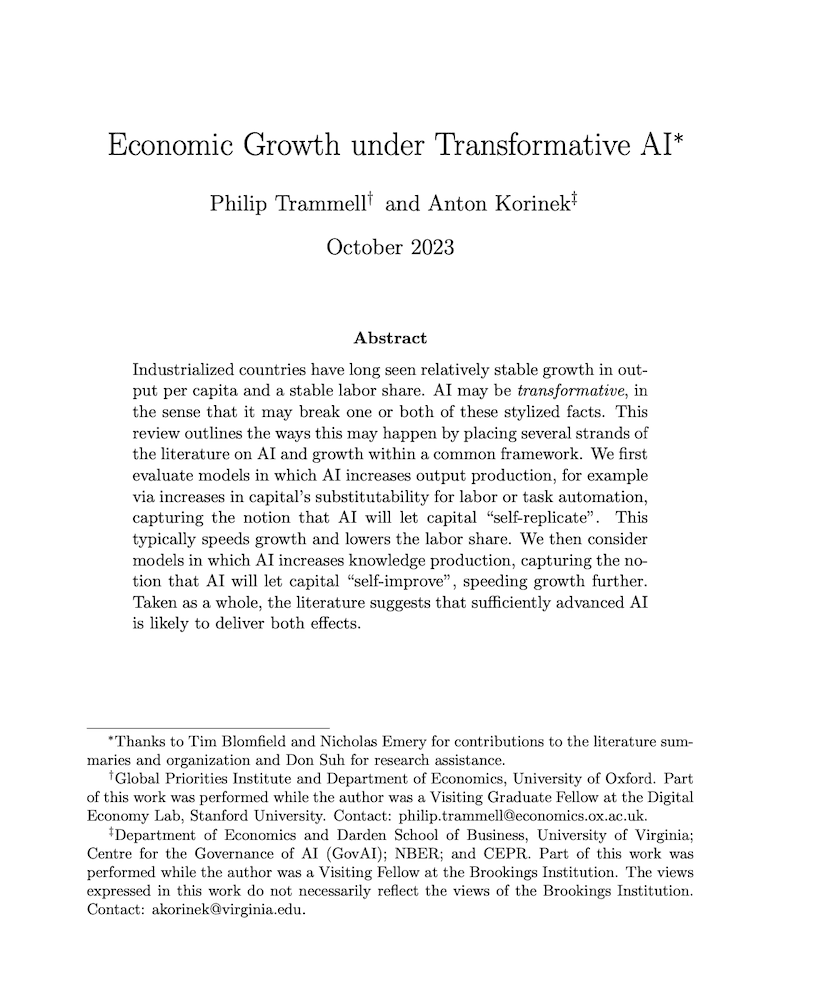Economic growth under transformative AI
Philip Trammell (Global Priorities Institute, Oxford University) and Anton Korinek (University of Virginia, NBER and CEPR)
GPI Working Paper No. 8-2020, published in the National Bureau of Economic Research Working Paper series and forthcoming in the Annual Review of Economics
Industrialized countries have long seen relatively stable growth in output per capita and a stable labor share. AI may be transformative, in the sense that it may break one or both of these stylized facts. This review outlines the ways this may happen by placing several strands of the literature on AI and growth within a common framework. We first evaluate models in which AI increases output production, for example via increases in capital's substitutability for labor or task automation, capturing the notion that AI will let capital “self-replicate”. This typically speeds up growth and lowers the labor share. We then consider models in which AI increases knowledge production, capturing the notion that AI will let capital “self-improve”, speeding growth further. Taken as a whole, the literature suggests that sufficiently advanced AI is likely to deliver both effects.
Other working papers
Minimal and Expansive Longtermism – Hilary Greaves (University of Oxford) and Christian Tarsney (Population Wellbeing Initiative, University of Texas at Austin)
The standard case for longtermism focuses on a small set of risks to the far future, and argues that in a small set of choice situations, the present marginal value of mitigating those risks is very great. But many longtermists are attracted to, and many critics of longtermism worried by, a farther-reaching form of longtermism. According to this farther-reaching form, there are many ways of improving the far future, which determine the value of our options in all or nearly all choice situations…
Funding public projects: A case for the Nash product rule – Florian Brandl (Stanford University), Felix Brandt (Technische Universität München), Dominik Peters (University of Oxford), Christian Stricker (Technische Universität München) and Warut Suksompong (National University of Singapore)
We study a mechanism design problem where a community of agents wishes to fund public projects via voluntary monetary contributions by the community members. This serves as a model for public expenditure without an exogenously available budget, such as participatory budgeting or voluntary tax programs, as well as donor coordination when interpreting charities as public projects and donations as contributions. Our aim is to identify a mutually beneficial distribution of the individual contributions. …
How should risk and ambiguity affect our charitable giving? – Lara Buchak (Princeton University)
Suppose we want to do the most good we can with a particular sum of money, but we cannot be certain of the consequences of different ways of making use of it. This paper explores how our attitudes towards risk and ambiguity bear on what we should do. It shows that risk-avoidance and ambiguity-aversion can each provide good reason to divide our money between various charitable organizations rather than to give it all to the most promising one…

